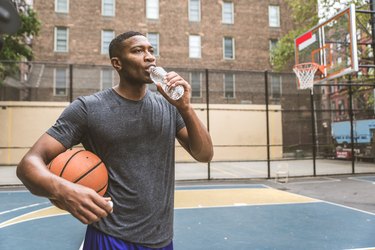
Whether you're nervous for a big job interview or exercising outdoors on a hot day, sweating bullets sucks. But perspiration is essential for regulating your body temp; sweat keeps you cool, comfortable and prevents you from overheating.
Plus, those little drips of dew can also reveal a ton about what's going on in your body. That's right: Sweat contains important information that can indicate anything from an underlying health issue to a nutrient imbalance.
Video of the Day
Video of the Day
Want to know what your sweat says about you? Read on for six things that your sweat can tell you about your health.
1. You’re Stressed
After a stressful day at work you might smell a little ripe. There's no doubt about it: Stress sweat stinks. But why? According to the International Hyperhidrosis Society, you have two types of sweat glands. Eccrine glands span many parts of your body and produce a clear, odorless sweat. Apocrine glands — found in your armpits and groin — generate a milky fluid that reeks once it encounters bacteria on the skin's surface.
In other words, apocrine glands are responsible for your funky odor. And here's the thing: Emotional distress triggers your apocrine glands, according to Mayo Clinic. That's why your sweat smells so awful when you're nervous.
So, what can you do? Try relaxation techniques like deep breathing and meditation to keep your stress levels in check. And when you bathe, use an antibacterial soap. This can help reduce the growth of those stinky bacterial critters on your skin — the culprits of your B.O.
2. You Have Hyperhidrosis (or Anhidrosis)
Do you have chronically sweaty palms or armpits for no apparent reason? Perspiring profusely with no clear cause may signal hyperhidrosis, a condition characterized by excessive sweating that's unrelated to heat or exercise, according to Mayo Clinic. A prescription antiperspirant or cream may do the trick, but you can talk to your doctor about potential treatments.
Conversely, if you barely glisten during a heart-pumping, high-intensity interval training (HIIT) workout or you're bone dry when it's 95 degrees outside, you might have anhidrosis. The opposite of hyperhidrosis, anhidrosis is the body's inability to perspire normally, per the Mayo Clinic. Because sweating prevents your core temperature from climbing to dangerous or harmful levels, this issue can be serious. Consult with a medical professional if you notice you're not sweating when feeling flushed or hot.
3. Your Blood Sugar Levels Are Low
Profuse sweating may be a sign your blood sugar is too low. When your blood sugar drops below 70 milligrams per deciliter, you're likely to produce waterfalls of perspiration, according to the University of Michigan Medicine. That's because when the body is under stress, it releases the fight-or-flight hormone adrenaline, which in turn makes you sweat.
The symptoms of low blood sugar — including nausea, headaches, shakiness, irritability and fast heartbeat among others, according to the American Diabetes Association — may indicate a more serious underlying health problem. To be safe, visit a physician who can properly assess and diagnosis your situation.
4. You’re in Shape
Are you drenched after a Spin class while your workout buddy barely broke a sweat? Don't sweat it. Heavy perspiration may be a sign you're in great physical shape. An April 2014 study in PLOS ONE found that people who are physically fit tend to sweat sooner and in greater quantities compared to their less active counterparts.
Read more: How Often Should You Work Out in a Gym?
But why? Basically, people who train regularly develop a faster response to a rise in their core temperature. Remember, sweating is your body's way of cooling you down. So when you're in shape, your body's cooling mechanism kicks in more quickly to regulate your temperature.
5. You’re Dehydrated
Sweating buckets means that you're losing lots of water. If your shirt is soaked through with sweat during a workout, odds are you'll need to replenish with some H20 to avoid becoming dehydrated.
An easy way to gauge whether you're properly hydrated is to check out the color of your pee. When your urine is pale yellow, you're golden (pun, intended). If it's a dark yellow, head to the nearest water fountain and start sipping.
The American Council on Exercise (ACE) recommends drinking 8 ounces of water 30 minutes before a workout, then 7 to 10 ounces every 10 to 20 minutes during the effort.
6. Your Electrolytes Are Low
Water isn't the only thing you lose when you perspire. Essential electrolytes — especially sodium, chloride, potassium, magnesium and calcium — get sweat out too. If you experience dizziness or muscle cramps, you might be secreting too much sodium, according to the ACE.
Replacing sodium is important for maintaining a proper electrolyte balance and healthy body function. To keep your sodium levels in check, ACE recommends snacking on something salty like a handful of nuts before a workout and then sipping on a sports drink during exercise, especially when it lasts an hour or longer.
- PLOS ONE: “Long Distance Runners Present Upregulated Sweating Responses than Sedentary Counterparts”
- Mayo Clinic: “Sweating and Body Odor”
- Mayo Clinic: “Hyperhidrosis”
- Hormone Health Network: “What is adrenaline?”
- American Council on Exercise: “Electrolytes: Understanding Replacement Options”
- University of Michigan Medicine: “Symptoms of Low Blood Sugar”
- American Council on Exercise: “How Hydration Affects Performance”
- International Hyperhidrosis Society: “Sweat and Odor”
Is this an emergency? If you are experiencing serious medical symptoms, please see the National Library of Medicine’s list of signs you need emergency medical attention or call 911.